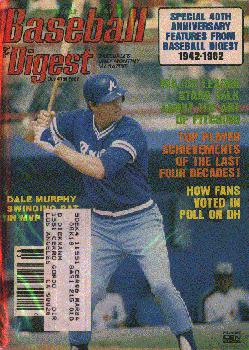

Last year, Dale Murphy was among the National League leaders in only one category--strikeouts. Otherwise, he had to look far down the statistics to find his name.
In the early going of the 1982 season, his name jumped out at him from all directions.
Runs batted in. Home runs. Slugging percentage. Runs scored. Doubles. Walks.
Murphy, the Atlanta Braves' consummate outfielder, was among the top five in the National League in all those categories. By mid-May, he ranked third in homers, first in RBI and second in runs scored.
"I look at the stats once in a while, just to see where things stand," Murphy admitted almost sheepishly. "But it's not something I do every day.
"It's not really something that gets me excited."
His start this year, though, excited the Braves, who watched disbelievingly as Murphy struggled aimlessly through last season. Could this Dale Murphy, one of the most productive hitters in the league this season, be the same Dale Murphy who fought so clumsily at the plate last year?
Consider: In the Braves' first 23 games, Murphy drove in half as many runs as all of last season (50) and was more than halfway to last season's home-run total (13). He was also halfway to last season's total in doubles (12) and almost halfway to last season's total in runs scored (43). And, he was far ahead of the pace in walks (44 last year).
But perhaps the most impressive statistics on Murphy this season are these: He had reached base safely in 22 of the Braves' first 23 games, unusual for a power hitter, and he was hitting .500 (12 for 24) with runners in scoring position.
Teammate Claudell Washington digested all of the statistics, including Murphy's .293 batting average, and said, "He is having an MVP-type season. That's what he is having."
An explanation, obviously, is demanded. How has the Murphy of 1981 evolved into the Murphy of 1982, who looks even better than the Murphy of 1980 (.281, 33 homers, 89 RBI)?
"I can't tell any difference," said Murphy, never overly analytical, "except that I'm getting more hits."
There is a difference, though. To most, it is easily perceptible.
Last season, Murphy at times seemed obsessed with pulling the ball, other times obsessed with hitting to right field. The word--confused. Now, he has been hitting the ball where it is pitched, using all fields.
Manager Joe Torre says, "The one thing I told him this spring was that pitchers would keep getting him out as long as he concentrated on hitting to one field. But a pitcher can't get anyone out consistently if he hits to all fields."
Last season, Murphy often took two strikes then swung at anything, usually a low-and-away breaking ball than no man alive could (or should) hit. This year, he is taking fewer strikes but resisting the garbage that manhandled him last year.
Washington, who considers himself a student of hitting, says, "Oh, yeah, I see the difference. Last year, Murf took a lot of pitches, and when he swung, it wasn't an aggressive swing. He just sort of waved through the ball. I thought he was hurt last year. Maybe his hand, maybe his back, something. But I never knew that, because Murf doesn't talk that much. (Murphy insists he had no injuries last season.)
"This is the type of year I predicted he would have last season," Washington added. "If he had done this last year, we'd have been in first place."
If Murphy keeps this up, a solid case can be made for him as the league's best all-around outfielder south of Andre Dawson, if not for him as MVP. It is Murphy the offensive player, not Murphy the defensive player, now on trial.
For the past two seasons, Murphy, 26, has proven unequivocally he can play defense with the best outfielders in the league. And for all of his offensive heroics this season, Murphy has stood out just as much in the field, taking away singles with diving catches, home runs with leaping catches, sacrifice flies with authoritative throws. He has played all three outfield positions thus far, but left field now is his regular spot. Pirates manager Chuck Tanner says, "There are just a few outfielders--four, five, maybe--in the league that you don't run on under any circumstances. You don't try to score on a medium fly ball. You don't go first to third. Murphy is one. He's one of the few power hitters I know who helps you even when he's not hitting. Mike Schmidt is one. Murphy. There aren't many.
For most of spring training, Murphy struggled at the plate, much as he did last season. He did not hit a home run all spring. But the last week of the exhibition games, he seemed to explode, and he has continued.
"Confidence is the name of the game," he said. "Last year, I didn't really do anything, and it's hard to stay confident when you're not doing anything. I never had any doubts about my ability to play the game. I was just not happy, just disappointed, about the season I had. If you're out there doubting yourself, you won't be successful.
"I don't know what is making the difference, honestly. I'm trying to be more aggressive . . . selective, but aggressive, if that makes sense. I'm walking more, but I'm still striking out a lot. So, I don't know what that means."
Murphy struck out 17 times in his first 82 at-bats, an average of about one strikeout every five at-bats, about the same ratio as for his major-league career. "But," as Torre pointed out, "you don't notice that he's near the top in strikeouts when he's also near the top in everything else."